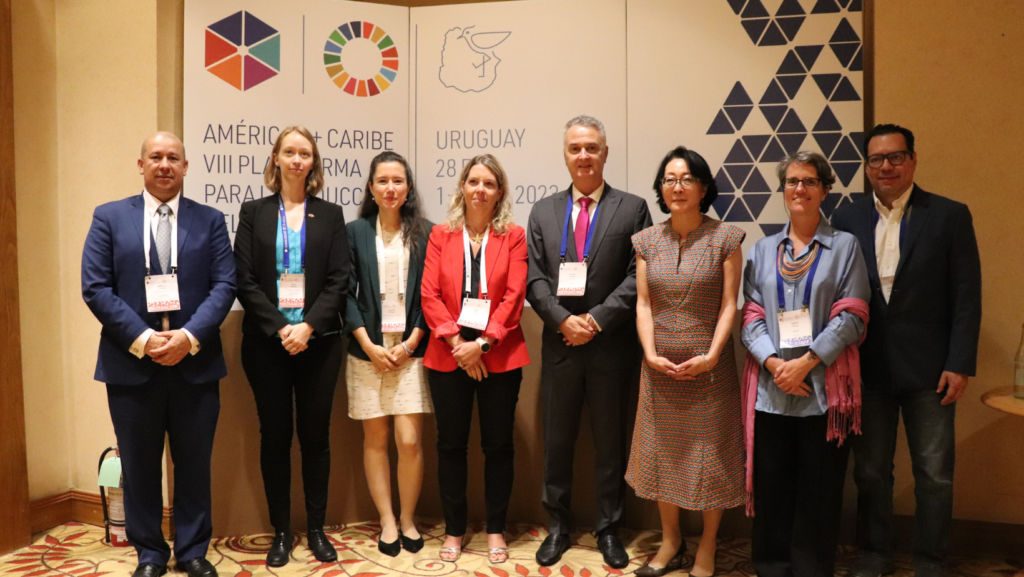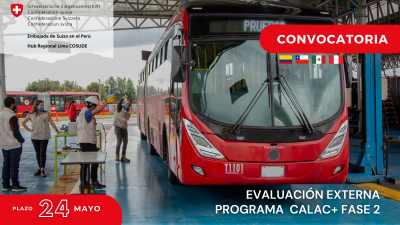From February 28th to March 2nd, 2023, the VIII Regional Platform for Disaster Risk Reduction in the Americas and the Caribbean (RP23) was held in Punta del Este, Uruguay under the slogan “Science and Technology for the Comprehensive Management of Disaster Risk”. More than 1,000 people attended the first face-to-face RP event since the COVID-19 pandemic, and another 2,000 people followed the event virtually. Throughout the event, local and national government officials, private sector representatives, non-governmental organisations, academics, researchers, and other stakeholders discussed the role of science and technology in disaster risk reduction, multi-sectoral risk governance and sustainable financing, and how the region can rebuild resilient infrastructures.

SDC supported the organisation of the RP23 and the participation of the focal points to the Andean Committee for Disaster Prevention and Relief (CAPRADE), and other partners at the RP23, a crucial contribution to share information, experiences and lessons learned from the local/national level to this regional process and vice versa.
The Regional DRR & RR Programme of the Regional Hub Lima – SDC, actively participated at the RP23, and, in collaboration with the SDC office in Managua, organised on March 1st the Side Event ¿Alerta temprana para reducir pérdidas y daños? Conectando comunidades a través de la ciencia y la tecnología (Early warning to reduce loss and damage? Connecting communities through science and technology). “Switzerland has been committed to disaster risk reduction since the adoption of the Hyogo Framework for Action in 2005, and actively participated in the negotiations of the Sendai Framework 2015-2030,” highlighted Daniel Derzic, Swiss Ambassador to Uruguay at the opening of the side event. “The side event will present three concrete examples of how early warning systems and early action can help reduce losses and damage caused by disasters and the effects of climate change.” The three experiences presented are the project Acción Anticipatoria en los Andes (Anticipatory Action in the Andes), implemented by Practical Action in Peru and Bolivia, the project Alerta Temprana ante Terremotos en Centroamérica (Earthquake Early Warning in Central America – ATTAC), implemented by the Swiss Federal Institute of Technology Zurich (ETH-Z), and the project Sistema de Alerta Temprana Volcanes en Guatemala (Early Warning System Volcanoes in Guatemala), implemented by the Association Vivamos Mejor Guatemala. In order not to leave the affected people behind, a video was shown with the voices of people with whom SDC partners work to connect them to Early Warning Systems and Early Action. Three key messages stand out from the Side Event:
- Early warning and early action save lives and assets, and thus are an important contribution to reducing loss and damage.
- Early warning systems are people-centered. Science and technology must facilitate people to connect with each other and with national disaster risk management systems.
- Early Warning Systems can help to break down silos between the Disaster Risk Reduction and Climate Change communities of practice, bringing together capacities and funding in science and technology to serve communities at risk.
The Side Event was attended by more than 600 participants, both in person and online. The networking reception organised after the Side Event was also a highlight, as it was the only event of its kind during RP23 and was much appreciated by the attendees.

The SDC delegation (Lima, Managua, and Port-au-Prince offices) had a bilateral meeting with Mami Mizutori, Special Representative of the United Nations Secretary-General for Disaster Risk Reduction, and head of the United Nations Office for Disaster Risk Reduction (UNDRR). Ms. Mizutori congratulated SDC on its reorganisation, which would be a model for others. She also stressed the importance of bringing together not only the humanitarian and development departments, but also the integration of issues such as DRR, climate change and environment.




RP23 concluded with an updated Regional Action Plan and an ambitious Ministerial Declaration. Ministers and senior officials from 31 countries of the Americas and the Caribbean have committed to implement the Early Warning for All initiative, announced by UN Secretary-General António Guterres last November, by 2027. The delegates also reiterated their commitment to substantially reduce disaster risk, protect life and health, and reduce economic losses caused by natural disasters in the region.
“The VIII Regional Platform for Disaster Risk Reduction in the Americas and the Caribbean has been a productive and hopeful gathering where leaders from across the region have agreed and reinforced their commitments to build a more resilient future,” said Ms. Mizutori during the closing ceremony. “People’s lives are our main commitment. In this regard, we need to shift comprehensive risk management policies towards people, making sure that science and technology are working for us,” she said.
We share the video “Voces de las personas afectadas” as well as the video of the side event “¿Alerta temprana para reducir pérdidas y daños? Conectando comunidades a través de la ciencia y la tecnología.“.
Useful links:
Web RP23








